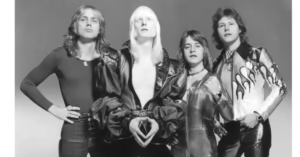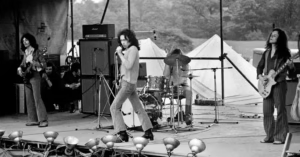Muddy Waters: The Man Who Electrified the Blues
Muddy Waters. Early Life and Roots in the Delta
McKinley Morganfield, better known as Muddy Waters, was born on April 4, 1913 (or possibly 1915) in Issaquena County, Mississippi, and raised in Clarksdale — a fertile ground for Delta blues.
Muddy Waters. Early influences:
- Son House and Robert Johnson
- Traditional acoustic Delta blues styles
- He earned the nickname “Muddy Waters” from playing in the muddy creeks as a child
He taught himself to play harmonica and later guitar, performing locally in juke joints and on plantation grounds while working as a sharecropper.
Muddy Waters. Discovery and Early Recordings (1941–1943)
Muddy was discovered by Alan Lomax in 1941, during the Library of Congress’s field recordings in the American South.
- Songs like “Country Blues” and “I Be’s Troubled” were recorded on-site
- These recordings showcased his raw Delta voice and guitar picking
- Encouraged by Lomax’s praise, Waters moved to Chicago in 1943 to pursue music professionally
Muddy Waters. The Birth of Electric Blues: Chicago and Chess Records
In Chicago, Muddy initially played acoustic but soon “plugged in” to be heard over the noise of city clubs. This shift created the electric blues style that changed music forever.
Signed to Aristocrat Records, which became Chess Records, in 1947
Key early singles:
- “I Can’t Be Satisfied” (1948)
- “I Feel Like Going Home”
These songs introduced his booming voice, slide guitar, and a sound that blended Delta roots with urban grit.
Muddy Waters. The Classic Era and Band Lineup (1950s)
Muddy assembled one of the most powerful bands in blues history, including:
- Little Walter – Harmonica
- Jimmy Rogers – Guitar
- Otis Spann – Piano
- Willie Dixon – Bass and songwriter
- Fred Below – Drums
Classic tracks:
- “Hoochie Coochie Man” (1954) – Written by Willie Dixon, it became a blues anthem of power and mysticism
- “Mannish Boy” – A defiant call to manhood and identity
- “I’m Ready”, “Got My Mojo Working”, “Rollin’ Stone”
His music was gritty, sexual, mystical, and utterly American, influencing every generation of guitarists to come.
Impact on Rock and Roll
took their name from Muddy’s “Rollin’ Stone.” His impact on rock is incalculable:
- Led Zeppelin, Jimi Hendrix, Cream, and AC/DC all drew from his tone and riffs
- Eric Clapton, Keith Richards, Jimmy Page, and Johnny Winter have all cited him as a hero
- British blues-rock of the 1960s — from the Yardbirds to — emerged directly from his sound
His songs were often covered, adapted, or imitated, and yet never equaled in rawness and swagger.
Later Years and Revival (1960s–1970s)
Though rock had taken blues to the charts, Waters struggled commercially during the mid-’60s, even experimenting unsuccessfully with psychedelic rock on Electric Mud (1968).
However, the blues revival brought him back:
- Performed at Newport Jazz Festival (1960)
- Appeared on The Last Waltz with The Band (1976)
- Collaborated with Johnny Winter on three acclaimed late-career albums:
- Hard Again (1977) – Features “Mannish Boy” redux
- I’m Ready (1978)
- King Bee (1981)
These albums were gritty, authentic, and returned him to form, bringing blues back into the conversation of rock-dominated America.
Death and Legacy
Muddy Waters died on April 30, 1983, in Westmont, Illinois, at age 70.
But his legacy lives on:
- Often considered the foundational figure of modern electric blues
- His swaggering vocals, slide guitar, and lyrical bravado paved the way for rock ‘n’ roll
- He brought the Delta blues into the urban era, forever changing the sound of popular music
Musical Style and Themes
Muddy Waters’ music is known for:
- Slide guitar mastery, often in open tunings
- Call-and-response structures from African American musical traditions
- Lyrical themes of sex, masculinity, struggle, superstition, and resilience
- A delivery that was earthy, commanding, and filled with attitude
He made blues both mythic and intimate, laying the groundwork for future expressions of rebellion in rock.
Awards and Honors
- 6 Grammy Awards (mostly in the 1970s)
- Rock and Roll Hall of Fame inductee (1987)
- Blues Foundation Hall of Fame
- His song “Rollin’ Stone” is part of the Rock and Roll Hall of Fame’s 500 Songs That Shaped Rock
- U.S. postage stamp issued in 1994
- Honored with a street named after him in Chicago
Interesting Facts
- He drove a tractor on the Stovall Plantation before becoming a star
- Keith Richards met Mick Jagger on a train because they noticed each other’s Muddy Waters records
- His guitar tone is still studied by blues and rock musicians today
- Many of his Chess Records sessions were recorded in one or two takes
- Muddy performed into his final years, often stealing the spotlight from younger rock acts




